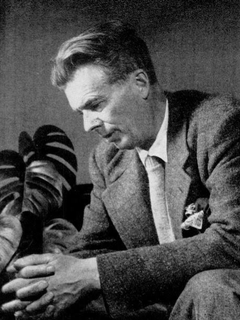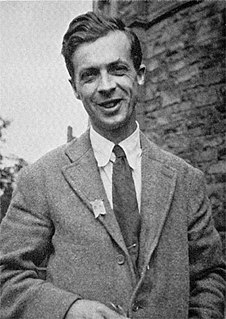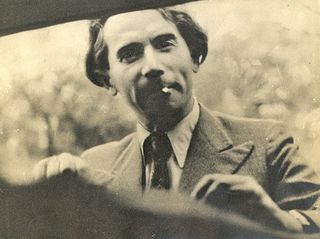Related Research Articles

Aldous Leonard Huxley was an English writer and philosopher. He wrote nearly 50 books, both novels and non-fiction works, as well as wide-ranging essays, narratives, and poems.

Sir Julian Sorell Huxley was an English evolutionary biologist, eugenicist, and internationalist. He was a proponent of natural selection, and a leading figure in the mid-twentieth century modern synthesis. He was secretary of the Zoological Society of London (1935–1942), the first Director of UNESCO, a founding member of the World Wildlife Fund, the president of the British Eugenics Society (1959-1962), and the first President of the British Humanist Association.

Chaim Azriel Weizmann was a Russian-born biochemist, Zionist leader and Israeli statesman who served as president of the Zionist Organization and later as the first president of Israel. He was elected on 16 February 1949, and served until his death in 1952. Weizmann was fundamental in obtaining the Balfour Declaration and later convincing the United States government to recognize the newly formed State of Israel.
Edward Max Nicholson was a pioneering environmentalist, ornithologist and internationalist, and a founder of the World Wildlife Fund.

Dartington Hall in Dartington, near Totnes, Devon, England, is an historic house and country estate of 1,200 acres (4.9 km2) dating from medieval times. The group of late 14th century buildings are Grade I listed; described in Pevsner's Buildings of England as "one of the most spectacular surviving domestic buildings of late Medieval England", along with Haddon Hall and Wingfield Manor. The medieval buildings are grouped around a huge courtyard; the largest built for a private residence before the 16th Century, and the Great Hall itself is the finest of its date in England. The west range of the courtyard is regarded as nationally one of the most notable examples of a range of medieval lodgings. The medieval buildings were restored from 1926 to 1938.

Arthur Henderson was a British iron moulder and Labour politician. He was the first Labour cabinet minister, won the Nobel Peace Prize in 1934 and, uniquely, served three separate terms as Leader of the Labour Party in three different decades. He was popular among his colleagues, who called him "Uncle Arthur" in acknowledgement of his integrity, his devotion to the cause and his imperturbability. He was a transitional figure whose policies were, at first, close to those of the Liberal Party. The trades unions rejected his emphasis on arbitration and conciliation, and thwarted his goal of unifying the Labour Party and the trade unions.

Sir Charles Galton Darwin was an English physicist who served as director of the National Physical Laboratory (NPL) during the Second World War. He was a son of the mathematician George Howard Darwin and a grandson of Charles Darwin.

James Maxwell McConnell Fisher was a British author, editor, broadcaster, naturalist and ornithologist. He was also a leading authority on Gilbert White and made over 1,000 radio and television broadcasts on natural history subjects.

Sir Leonard George Holden Huxley was an Australian physicist.

Sir Charles Kingsley Webster was a Cambridge-trained historian and British diplomat. He was educated at King's College, Cambridge as well as the Merchant Taylors' School, Crosby. After leaving Cambridge University, he went on to become a professor at Harvard, Oxford, and the London School of Economics. He also served as President of the British Academy from 1950 to 1954.

Leonard Knight Elmhirst was a British philanthropist and agronomist who worked extensively in India. He co-founded with his wife, Dorothy, the Dartington Hall project in progressive education and rural reconstruction.

The Directorate of Military Intelligence (DMI) was a department of the British War Office.
Cyril Bibby was a biologist and educator. He was also one of the first sexologists.
Air Marshal Sir Thomas Walker Elmhirst,, was a senior commander in the Royal Air Force in the first half of the 20th century and the first commander-in-chief of the Royal Indian Air Force upon Indian independence in August 1947, in which post he organised the funeral of Mahatma Gandhi following his assassination in 1948. He later became the Lieutenant-Governor and Commander-in-Chief of Guernsey from 1953 to 1958.

Christopher David George "Kit" Nicholson was a British architect and designer closely associated with the early Modern Movement in Britain. His most notable works of the 1930s were comparable to the advanced modern abstract style of his older brother, the artist Ben Nicholson.
Marcus Joseph Sieff, Baron Sieff of Brimpton OBE was a British businessman and chairman of his family company, the retailer Marks & Spencer, from 1972 to 1982. He was also a leading figure in UK Zionism.

Benjamin Marcus Bloch (Hebrew: בנימין מרכוס בלוך, was an Israeli physicist, known mainly for his work at the Weizmann Institute of Science.
Sir Frank Leonard Engledow was a British agricultural botanist who carried out research at the Plant Breeding Institute at the University of Cambridge from 1919 onwards. He was a fellow of St John's College (1919–1985), Cambridge, and held the positions of University Lecturer in Agriculture (1926–1930) and Drapers Professor of Agriculture (1930–1957) at Cambridge, where he directed the School of Agriculture from 1930 to 1957. Engledow advised the British government on agricultural production in the (former) colonies as well as in the homeland from 1927 to 1962. He continued to publish on agricultural practices and teaching after his retirement.

Sir Leon Simon was a leading British Zionist intellectual and civil servant who took part in the drafting of the Balfour Declaration of 1917 and served on the Zionist Commission with Chaim Weizmann. An advocate of cultural Zionism and the revival of Hebrew language, Simon was a scholar and translator of Ahad Ha'am, and produced the first modern Hebrew translations of Plato. He served as the Chairman of the Hebrew University of Jerusalem’s Executive Council, and from 1949–50 as the university's President.
François Lafitte was a French-born British political activist, social researcher, professor and abortion lobbyist. He was professor of social policy and administration at Birmingham University from 1958 to 1980 and chaired the British Pregnancy Advisory Service from 1968 to 1988.
References
- ↑ Huxley, J.S. (1970) Memories. Allen & Unwin: London ISBN 0-04-925006-X p.210.
- ↑ http://www.dartingtonarchive.org.uk/lke_pep.html Papers of Leonard Knight Elmhirst at The Dartington Hall Trust
- ↑ Huxley, ibid.
- ↑ Sampson, A. (1962) Anatomy of Britain. Hodder & Staughton: London. p.248, 454.